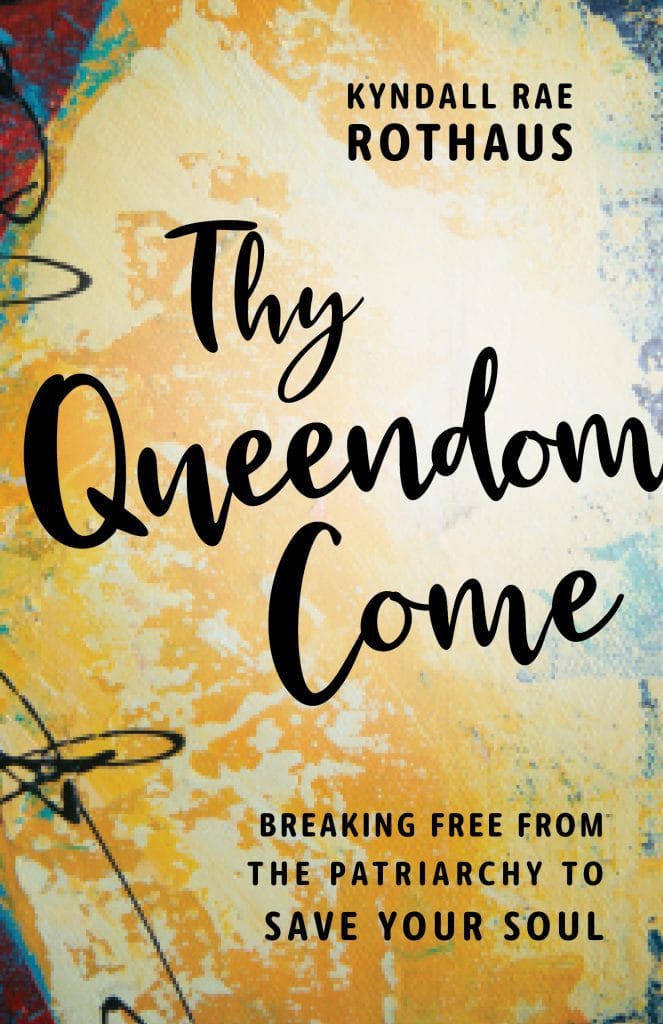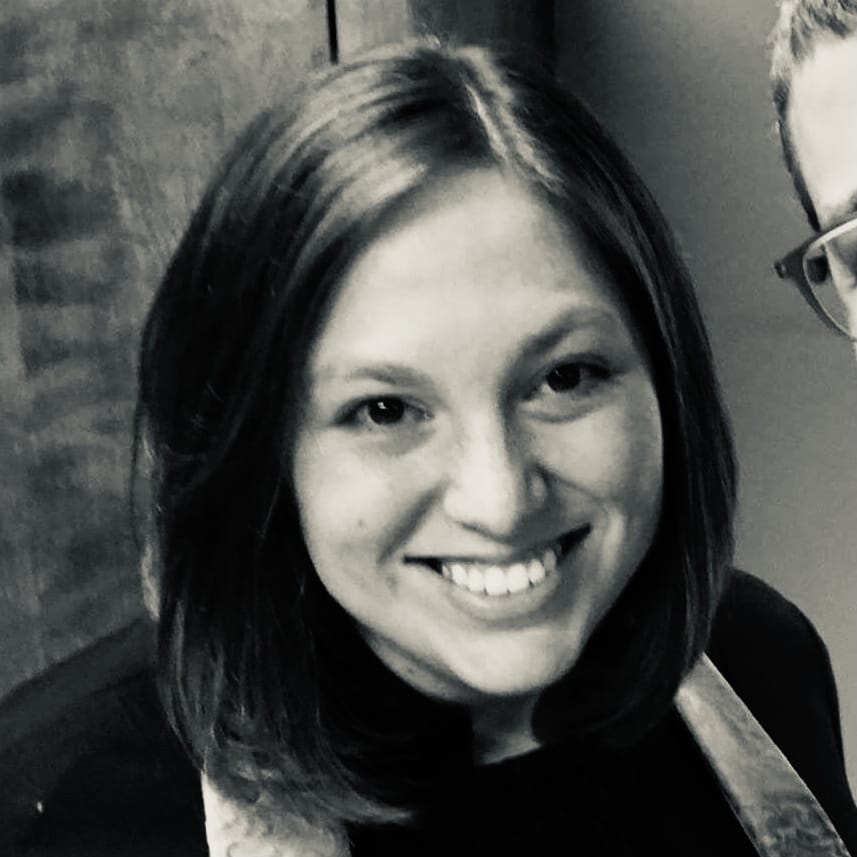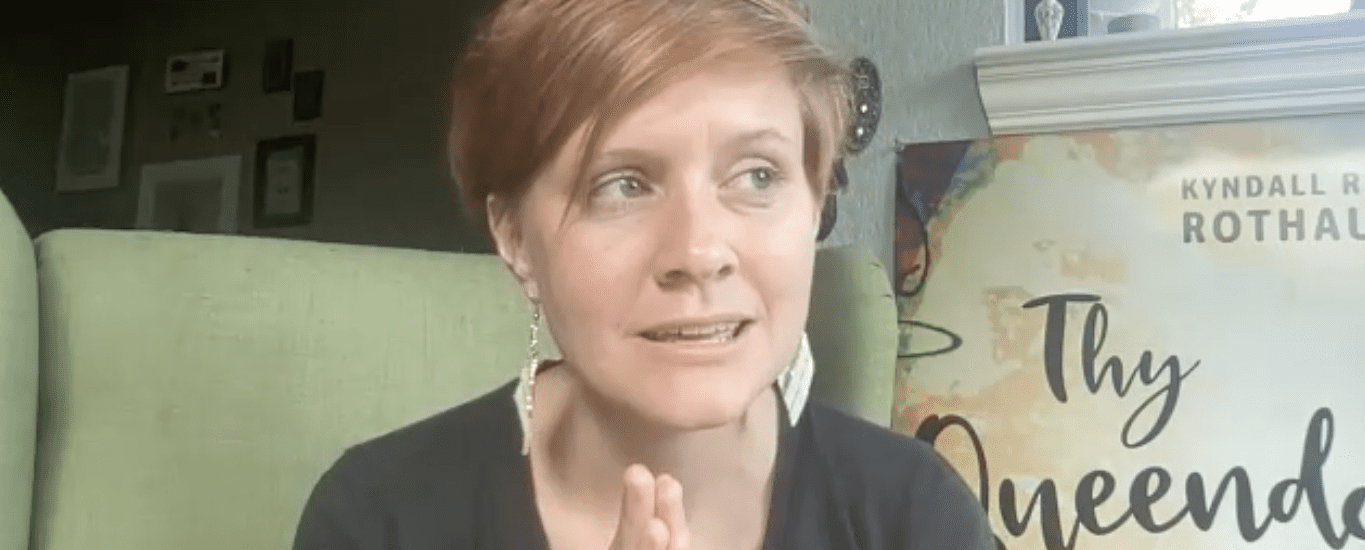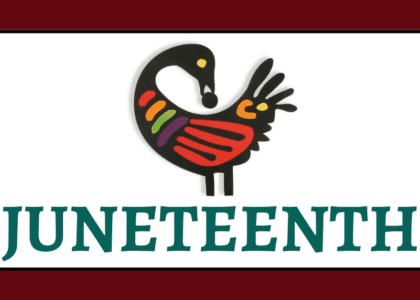By Claire Helton

This week I had the privilege of sitting down over Zoom with my colleague and former pastor, Rev. Kyndall Rothaus, to discuss her new book, Thy Queendom Come: Breaking Free from the Patriarchy to Save Your Soul. The book will be released on August 17th and is now available for pre-order; you can find out more at www.kyndallraerothaus.com.
CH: I’ve seen you talk about your books, both Preacher Breath and now Thy Queendom Come, as your “babies” that are now out in the world, out of your reach. I know there’s got to be so much intentionality in the choice to bring a book into the world, and I’m so glad you’ve given us this one. I’m wondering if you could start off just sharing with us the genesis of the book. Why this book? Why right now?
KR: Thank you. When I look back over the course of my life, and the various obstacles I’ve overcome, or oppression, or self-doubt, all of it (for me, at least) can be tied back to patriarchal values and patriarchal conditioning. And so, in some ways I feel like this book is my way of telling my story, of finding my way out of that to a self and a spirituality that feels more whole and authentic. And, at least for me, those patriarchal values that I learned were almost always tied to religion, and theology, and church, you know? So, while there’s value to tackling patriarchy as a systemic and cultural issue that we face, I think there’s also a lot of value to addressing the specific religious roots that allow it to flourish because it’s still affecting lots of women, and men, in religious settings today.
CH: Of course. It makes sense that out of your particular wounding, not just as a woman but a woman in a religious setting, this is what would come of that. There’s so much to talk about when it comes to feminism and the patriarchy, but this is where you have had the most healing and growth, so naturally this is where you’ve chosen to use your voice.
KR: And in terms of why now, partly it’s when inspiration struck, but also it feels like I am at this point in my life where there’s a culmination of various streams of growth all coming together. And culturally I think the conversation is ripe. I’m not the only one talking about this or writing about this. There are women and men and nonbinary folks, just a whole lot of us that are questioning religion as it was handed to us, and not just deconstructing but really hungering for an alternative. Like, it’s not just about burning it all down, it’s about what beautiful thing can we recreate in its place.
CH: You know, I noticed that Carol Christ’s endorsement was phrased, “If Christianity is to be transformed, this is a way forward,” and that “if” was in my mind as I was reading. I imagine for many of your readers, that will be a pressing question: Do I want to be a part of the replacing, or do I just want to say, enough?
KR: Well, I will say I think part of my hope with my book is that people would feel permission to choose either of those options, or some third alternative we haven’t thought of yet. What was neat about Carol Christ’s endorsement is that she wouldn’t consider herself Christian anymore, she’s kind of given up on that. But for her to be able to read the book and say, “but if” – if Christianity were to be redeemed, this is a way to make sense of it…at least to me, that felt like high praise, for someone who’s given up on it.
CH: Right, “I can’t necessarily see a way forward, but if there’s going to be one, I trust this person and the vision she’s laid out.” That is high praise.
So, speaking of the vision you’ve laid out, let’s talk about the Queendom. Here in the Alliance, we’re pretty familiar with the language of “kindom” to replace “kingdom” talk. You made a different choice in your book, and you talk some about why the shock value of “queendom” is actually a significant part of the rationale for using it in the first place. Could you elaborate for us here about how you made that choice?
KR: Well the first thing I want to say is that I do value the language of kindom, and I think that absolutely has a place in our theology; it’s been a really important critique offered by mujerista theologians. And yet, there are some significant reasons I wanted to use a word like queendom.
So when I think about my own story, when I started college that was my first introduction to the idea of using “God” and “Godself” in papers rather than “he”—you just take out all the pronouns, right? And there was something a little bit shifting about that, in an academic setting, removing all the masculine pronouns. But it didn’t do a lot for me. You know, it made me a little more conscious of how often we use “he” and a little more conscious about my language.
But it wasn’t until I began, in my personal spiritual practice, really allowing myself to imagine God in the feminine form—and that doesn’t mean I therefore think God is only female, but allowing that addition into my imagination of God—that’s when some of those patriarchal things really got dismantled. It was like I needed something bold, you know? To get in there and stir things up. And I just suspect that if that’s the case for me, that’s maybe the case for us culturally. Sometimes using gender-neutral or nonbinary language for God can be this great way of emphasizing that there is a place for all genders, and that’s important. But there are other instances where instead of it being that step toward inclusion, it’s just a very careful, cautious step that seems acceptable to the patriarchy—to just not call God “he” as much. But to use a word like queendom, to use a word like She, it sort of forces a reckoning with the exclusively masculine picture of God. You can say kindom and still imagine a totally male God.
CH: Right – because of our conditioning, we can pat ourselves on the back for taking the step of using kindom and it can still be “Father God” that we’re imagining in that familial metaphor.
KR: Right. But queendom makes you go, “Oh, wait a second. Maybe Father God is not the whole picture.”
CH: I’m remembering my first attempt to read Sue Monk Kidd’s Dance of the Dissident Daughter several years back. When she started using the word “Goddess,” I found that I had to put the book down for several months before I could come back to it because I was so conditioned to shrink back from that explicitly female language for the divine. It was like I felt my spirit cringing when I so much as read the word, and this was after years of using “Mother God” language in a progressive church. It was something about that word “Goddess” that threw into relief how gendered the word “God” is, but it only becomes visible when you start using Goddess. So I think you’re right, that the boldness of queendom is such an important part of it.
KR: Yes. And if queendom makes you uncomfortable but kindom doesn’t, I think that’s a question worth exploring. What is that deep inside that’s causing you to feel unsettled?
CH: So, speaking of that feminine language for the divine, as I prepared for this interview I was reminded of the song “Her” from Alanis Morissette’s album last year; it’s a sort of musical tribute to the divine feminine. As I listened through it again, the line that stuck with me was:
“She’s not buying my shell / She sees right through my armor / She lingers in my shadows knowingly / She treats them like they’re angels / And maybe they are angels really / She beckons me to braver inquiry.”
This feels like exactly what your book is calling its readers toward: braver inquiry, especially into those shadowy places deep within ourselves where the patriarchy has taken root. You go there explicitly in the chapter called, “It’s an Inside Job First”—can you talk some about how contemplative inner work fits into your vision of the queendom?
KR: Yes, I mean to me they’re irrevocably tied together, because the patriarchy teaches us (women especially, but I think everybody) to distrust your inner life, because that’s how they get you to submit to external authority only. “Your heart is deceitful above all things and desperately wicked, who can trust it?” So there’s this sense that what you can feel on the inside, what resonates on the inside, does not matter. What matters is what the religious authorities say, or “what the Bible says” (as interpreted by the religious authorities). So there’s just this continual shoving down of what you might know or experience in your own authentic soul. Whereas the contemplative path is all about diving in deep to that inner place and learning how to walk alongside your fear, rather than your fear controlling you. So I think in order to do that deep contemplative work, it requires letting go of that notion that external authority is inherently better than internal authority. I don’t even understand how you could really be contemplative without that shift of where the locus of authority lies.
CH: Yes, yes. So Glennon Doyle uses the language of “Knowing” to talk about a similar idea, and she has a story in Untamed about a woman saying, “How can I trust my knowing, what if my knowing wants me to drink a whole bottle of Malibu every night?” (Or something.) And Glennon responds “Well, that’s probably not your Knowing, and I can tell because of the way you asked the question. You asked in that way because you already know that that’s not what is most true for you, or most beautiful.” It’s like how we as clergy often use language about how Love is the standard because God is Love, or in your book you use the term “the Reign of Love” as another way to talk about the Queendom, and I think that’s a beautiful sort of shorthand for what Glennon Doyle is calling Knowing, or for the contemplative value system you’re lifting up in your book.
KR: It reminds me—I think I wrote about this in chapter four—of course, when you’re listening to your inner self, discernment is still required, right? You still have to be like, “Hmm, why is it that I think my knowing is telling me to drink every night?” You still have to do that discernment process, but that doesn’t mean that that discernment process is then somehow inherently more flawed than the discernment process you have to go through when you’re listening to external authorities.
CH: Or the discernment process or interpretive work those authorities had to go through before they declared their “wisdom” to you.
KR: Right, there’s always discernment! So, to act like, ‘As long as we trust external voices, no discernment is required, we can just follow along blindly’—that doesn’t make any sense. Sure, in your own life you might choose something that you think is loving in the moment and later realize, Hmm, you know actually I think the loving choice would’ve been this instead of that. There’s this ongoing evolving sense of our understanding of Love, but the fact that it evolves and can change and we have to discern doesn’t mean that therefore that internal process is more flawed than what we get when we listen to voices outside ourselves.
CH: So this brings me to my next question, which is about our ability to change our minds. In the book you talk about the queendom value of changing our minds, of cultivating an openness to the shifts in our internal landscape that emerge from within. What have you been changing your mind about lately?
KR: So, I like to think that I’m always evolving, but what I could name specifically, both in the past year and also just even in the last few weeks, is that I’ve really been changing my mind about boundaries, about how okay it is to use my voice and to set them, and about the fact that I’m not as responsible for how someone feels about my boundary as I have thought that I was in the past. And people who are really good at holding their boundaries are probably like, duh, but you know, I have just taken on other people’s emotions so many times in my life. And that has either prevented me from setting the boundary, or I’ve set it very apologetically, or I’ve set it in a very vague way so as not to upset anyone, and I’m just changing my mind about that. Like, I don’t actually need to do all that extra emotional labor, I can just set the boundary. So, that’s the big one for me right now.
CH: Well, I’m going to have to keep working on that one.
KR: Ha! It’s not that I’m good at it yet! But I do think I’m having a shift mentally and emotionally around it right now.
CH: And boundaries are hard, too, when you’re in a season of shifting, right? I’m sure I’m not the only one of your readers who’s been through some significant life shifts because of the experience of waking up to the ways the patriarchy has seeped into, just, everything.
KR: Yes, I feel like I’ve been in that place many times in my life, thinking like, oh I’m in the right fit, the right job, the right relationship, the right whatever, and then later realizing I’m not.
CH: Yes—which doesn’t mean it was wrong at the time.
KR: Yeah, exactly.
CH: So speaking of being in the right job, you tell several stories from your experience pastoring churches, and then you talk some about the dream work that aided in your realization that it was time to move on from pastoring. I know you to be an incredibly wise and pastoral presence. I’m wondering where in your life you see those gifts being expressed? (Because I feel confident that they are!)
KR: I actually feel like now, outside of the limitations of institutional church work, I am getting to use my gifts more, or that I’m getting to use a fuller version of them. So, for example, I love my work as a spiritual director. It feels like the best parts of pastoring without any church politics, without any committee meetings, it’s just doing soul work with people and that feels really, really good. It feels like oh, well this is kind of why I went into ministry to begin with.
And then I also feel free to just use my authentic voice—and I do feel like even in a traditional pastoral role I had a pretty strong commitment to using my voice regardless of the consequences, but now I don’t even have to worry about consequences! (Ha!) At least, I don’t have to worry about it in the sense of being concerned that, oh gosh, if I say this thing is this person going to stop tithing? It’s those practical things that, even if they don’t hold you back, they at least weigh you down. And I don’t have to carry that weight anymore. And so, I find the work that I get to do with Nevertheless She Preached, the work I get to do writing books, in all of that I feel liberated to use my gifts, unfettered, uninhibited.
CH: So as someone who has, myself, recently stepped away from pastoring, I hear you saying, “Come on in, the water’s fine.” At least, that’s what I want to hear, ha! So that’s good.
KR: Ha, right. I mean, it’s not always clear, there’s that loss of title, and you know, I don’t want to gloss over that. There has been some struggle with identity loss, but ultimately it feels like that struggle pales in comparison to the gift of just stepping out and doing the thing.
CH: So, in the book, you spend a lot of time telling and recasting the stories of women in scripture. And I’m struck by the tension you acknowledge when it comes to stories from scripture, that tension of reading through feminist eyes without pretending the Bible is a feminist document. Why do you think it’s important to keep telling and retelling the stories of biblical women, even as we acknowledge the complicated relationship of women to the text?
KR: Yes, that is such a good question, because I certainly have my moments of, like, maybe I just want to leave this all behind. But someone, and I wish I could remember who, but somebody said something to me using the phrase “staying power” to talk about scripture, and it has stuck with me. It’s this sense that no matter what else we write about or whatever else we bring to the table, scripture continues to have staying power culturally, and so to sort of subvert that – like to use the very thing that has the staying power and say, Hey, what if we flipped this on its head and looked at it this way? That just feels important.
And I don’t know that that’s everybody’s calling to keep doing that work, but it feels like I can do it and it feels like I can do it well, and so that idea of staying power has gripped me. Like, because it (scripture) has staying power, then it needs to be grappled with in order to clear a path for other people’s freedom. If it didn’t have staying power nobody would care, but because it does, that means so many people are still gripped by those questions of, “What’s in the Bible? What do the Bible stories say? What does the Bible have to say about my life?” And so to be able to take that thing that has so much power and then to say, “There’s a whole other way of reading this thing,” that feels important.
And the second reason I’d say it feels important to me is that even though I do believe the Bible was written in a patriarchal culture, predominantly by men who upheld those patriarchal values, so I don’t believe the Bible is a feminist document – what that means, though, is that these strong feminine characters that we get in the text, that kind of means they’re that much more badass, right? That they were able to accomplish what they accomplished, or that they were able to have the voice that they had? It’s kind of that recovery work of not just allowing the Christian story to be told from the dominant viewpoint. As long as Christianity is going to continue to exist in the world, and I think it is, let’s tell the other side of the story.
So I think for those two reasons it feels important to me.
CH: I absolutely hear discernment in what you’re saying. You’ve discerned where your gifts lie, in telling those stories and doing it subversively, and so effectively, so of course that’s sort of your angle on the work of continuing to dismantle the patriarchy. It’s certainly a skill set that anyone who’s ever heard you preach would be able to testify to.
KR: Yes, and I will add that now that I’m not preaching every week in a pastoral setting, I’m also asking myself the question, What does my soul have to say apart from a text? Like, if she just got to speak and didn’t feel that she had to start with a text, what would it be? And that has value to me, too. I want to hold both of those realities. I think I have a particular skill set at taking the established story and thinking through it in a new way, and not everything I have to say about life and not everything I have to say about God has to start with the biblical text, to me. That’s kind of where I am.
CH: That feels both beautiful and true. Well, to end on a note of more beauty and hope, let me ask: When it comes to the world of feminist theology and activism, where are you finding hope right now?
KR: I think I’m finding hope in the fact that I’m not a lone voice crying out in the wilderness, that really what I’m writing about is a contribution to a conversation that has already been going on and is continuing on. Sometimes, that makes me feel intimidated—like, what do I have worth adding?! But when I can sort of step back and look at it without my impostor syndrome in the way, I realize, no, that’s actually a really good thing, that there’s this collective uprising.
And then the second thing I’d say is hopeful to me is the way I see feminism expanding to be far more intersectional. Of course, there are types of feminism that ignore or reject that sort of intersectional work, but the hopeful place is where I feel like people are coming together, recognizing this notion that I can’t be liberated unless you’re liberated. And so we’re working together and seeing the ways that patriarchy is tied to white supremacy is tied to heterosexism, just connecting all of those things together. That feels—I mean it’s discouraging how bad it is, but it’s also hopeful to see the ways that we’re beginning to figure out how to work together.
CH: Right, yes. There’s an incredible weight to the ways those many differing oppressions intersect, but once we’ve allowed ourselves to feel that weight, it can also be this opportunity to begin to rise—and to do it more effectively, and to do it together.

Claire Helton is currently a Th.M. candidate at Vanderbilt Divinity School studying the ethical implications of feminist and queer readings of scripture. She is settling into life in Nashville, TN with her husband, Zach, and their two children, James and Peter. From 2016-2018, she served on staff at Lake Shore Baptist Church in Waco, TX while Kyndall Rothaus was Senior Pastor.




Recent Comments